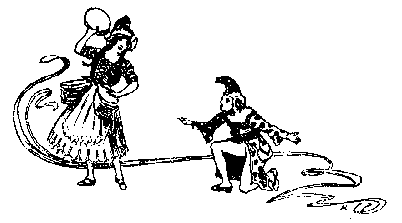Gilbert & Sullivan Opera
A History and a Comment
by H. M. Walbrook
CHAPTER II.
A TOOLE AND NELLY FARREN OPERA.

Let us now take a glance in chronological succession at the various pieces in which our famous pair collaborated. As I have already mentioned, the first to be produced was an "entirely original grotesque opera," entitled Thespis, or The Gods Grown Old. It is much less known than the pieces which followed from the same hands. Its musical score was never published, and when asked in later years why this was so, Sullivan answered with a laugh that he had saved up its tunes for other operas. The libretto, on the other hand, was published in the usual paper covers of the period, and is also to be found in the pocket edition of Gilbert's plays, issued in small volumes a few years before the Great War.
Young as they were in 1871-Gilbert in his thirty-fifth year, and Sullivan only in his twenty-ninth — the author and composer were even at this period quite wellknown men in their respective spheres. Gilbert had written and seen successfully produced a large number and variety of dramatic compositions, including The Palace of Truth and Pygmalion and Galatea, by the latter of which he was said later to have made forty thousand pounds, and was also known as the author of the "Bab Ballads," while Sullivan's compositions, notably "The Prodigal Son," the music for "The Tempest" and the "In Memoriam" overture (expressing his grief for the loss of his father) had already made his name familiar throughout the musical world, not here only but on the Continent. His two operettas, Cox and Box and Contrabandista, had also helped to make him known.
The scene of Thespis is laid on the summit of Mount Olympus, where the gods of the classic mythology, from Jupiter downwards, are still residing, although both they and their temple are visibly the worse for wear. Presently a travelling theatrical company, headed by a comedian who modestly calls himself Thespis (a part played by J. L. Toole) appear at the top of the mountain.
They have climbed up from the Thessalian Plain to bold a picnic, and here they meet Jupiter, Apollo, Mars, Diana and Mercury, all of whom, with the exception of Mercury (Miss Nelly Farren) have grown deplorably old in body and mind, very much behind the times, and out-of-date. Thespis presently suggests that the Divinities shall take a trip down to earth incog., mingle with the world, hear and see what people think of them, and judge for themselves as to the best means of reviving their influence. "But what is to become of Olympus in the meantime?" asks Jupiter. "Lor' bless you, don't distress yourself about that," replies Thespis. "I've a very good company used to take long parts on the shortest notice. Invest us with your powers, and we'll fill your places till you return." To this the Divinities agree, and, leaving Mercury behind with the players in case of any difficulty arising in which his advice may be useful, they descend to earth, while the actors and actresses take over their identities and carry on. As Thespis warbles to his company:
- While mighty Jove goes down below
- With all the other deities.
- I fill his place and wear his "clo" —
- The very part for me it is.
- To mother-earth to make a track
- They all are spurred and booted too,
- And you will find till they come back,
- The parts you best are suited to.
- Chorus:
- Here's a pretty tale for future Iliads and Odyssies.
- Mortals are about to personate the gods and goddesses.
- Now to set the world in order we will work in unity,
- Jupiter's perplexity is Thespis' opportunity.
The results of the transposition are disastrous. Acting under Thespis's hint that they need not consider themselves bound by precedent, the suddenly deified Thespians start all sorts of calamitous experiments. For example, one of them named Sparkeion (a part which, from all one has heard and read, must have been played very delightfully by Mlle. Clary), takes the place of Phoebus, the God of Day, and develops a habit of walking out at night with his sister-actress, Nicemis, who has changed places with the Moon. The deputy-Venus, who in propria persona is an actress with a personal taste for experimental science, gives orders that hence-forward all babies are to be born grown-up. The deputy-Ceres commands that all crops shall now grow upside down! The deputy-Mars abolishes war, with the result that no two nations are on speaking terms; the deputy-Chronos, finding the allotment of seven days to a week awkward, abolishes Saturday, with the result that all the fogs of that day get crowded into Friday, and the citizens of Athens are afflicted with a murky Friday every week for six months in succession! Finally, the actor who becomes the deputy-Bacchus, happens to be a rabid teetotaller, and arranges that the vines of Mitylene shall grow nothing henceforth but gingerbeer!
Moreover, various love-affairs indulged in by the newly-made Divinities begin to clash seriously with their human matrimonial engagements, and any amount of scandal and friction results. And, while this is the condition of affairs on Mount Olympus, the real Divinities are faring no better in the world below, and at last both they and their Thespian locum tenentes are thankful to change places again, and get back to their proper spheres.
The dialogue contains many an authentic Gilbertian touch, as, for example, the following scene, early in the play, between Jupiter (who is presented as an extremely old gentleman, very decrepit, with a thin, straggling white beard, and wearing a long braided dressing-gown handsomely trimmed, and a silk nightcap), Diana and Apollo:
There is no mistaking the hand that wrote that.
As to the lyrics, the song "Little Maid of Arcadee," which was sung by Mlle. Clary, is one of the neatest of Gilbert's ditties, packed with cynicism and slyness, expressed in terms of sentimental tenderness; and another hit was made by Thespis's rhymed parable (sung by Toole) of the gentleman who undermined his influence by mixing with his inferiors. This began as follows:
- I once knew a chap who discharged a function
- On the North-South-East-West Diddlesex junction.
- He was conspicuous exceeding
- For his affable ways and his easy breeding.
- Although a chairman of Directors
- He was hand-in-glove with the ticket-inspectors,
- He tipped the guards with brand-new fivers,
- And sang little songs to the engine-drivers.
- 'Twas told to me with great compunction
- By one who had discharged with unction
- A chairman of Directors' function
- On the North-South-East-West Diddlesex junction.
- Each Christmas Day he gave each stoker
- A silver shovel and a golden poker.
- He'd buttonhole flowers for the ticket-sorters
- And rich Bath buns for the outside porters.
- He'd mount the clerks on his first-class hunters
- And he built little villas for the road-side shunters,
- And if any were fond of pigeon-shooting
- He'd ask them down to his place at Tooting,
- 'Twas told to me, etc.,
and so on, through three more verses. And the point of this song lay in the fact that it was generally understood as a genial quizzing of the then Duke of Sutherland, who was notoriously fond of driving a railway engine, and upon whose death in 1892 the Times printed this story of him: "An admiring navvy seeing him one day start in his engine from Dunrobin Station exclaimed to his mate, 'There! that's what I call a real dook! Look at 'im, a'drivin' of 'is own engine, on 'is own railroad, an' burnin' 'is own blessed coals!'" The Duke worked a coal pit close to Dunrobin.
The performance of Thespis lasted just an hour and a half, from 9.30 p.m. to 11 p.m., and it was given as an after-piece to H. J. Byron's comedy, Dearer than Life. As I have mentioned, it was not a very great success, and, in spite of the comicality of Toole, the vivacity of Nelly Farren (in a tightfitting silver suit), and the charm of Mlle. Clary, with her pretty face and piquant broken English, the bill was changed after a few weeks. It is not easy to say why the piece failed. In the mass of huddled scraps and snippets by the late John Hollingshead called "Gaiety Chronicles," and purporting to be a history of the theatre while under his management, no explanation is offered ; and in a later brochure, entitled, "Good Old Gaiety," all he says of Thespis is that it had "defects." Old playgoers, however, who vividly remember the production have told me that in 1871 the general public of London were not quite ready for the peculiarities of Gilbertian humour. That may be the true explanation. Or, perhaps, the fact that the company was stronger on the comic than on the vocal side made for failure. And again, it was the policy of Mr. Hollingshead at that time to be frequently changing his bill with matinees of other plays with other casts, a course which can scarcely have helped the fixed evening programme.
Whatever be the explanation of the short “run" of Thespis, the next Gilbert and Sullivan opera to be produced, was destined to spread far and wide the fame of the new combination.
Four years were to pass before that event — years of arduous work by both men in their respective spheres, literary and musical; years also of a deepening understanding between them as to the "possibilities" of authentic English comic opera. The result was that usually seen uafter-piececircumstances. When their "chance" came they were quite magnificently ready. In 1875 another gifted and farseeing young man, Mr. D'Oyly Carte, happened to be acting as manager of the theatre in Soho, where a short musical "after-piece" was required. He concluded that the men to write it were Mr. Gilbert and Mr. Sullivan; the commission was duly given to them; and in about three weeks the piece that was to be the first to make their collaboration famous was ready for rehearsal forthwith.
